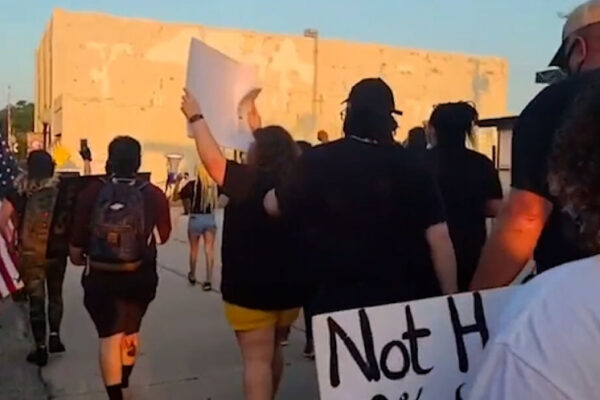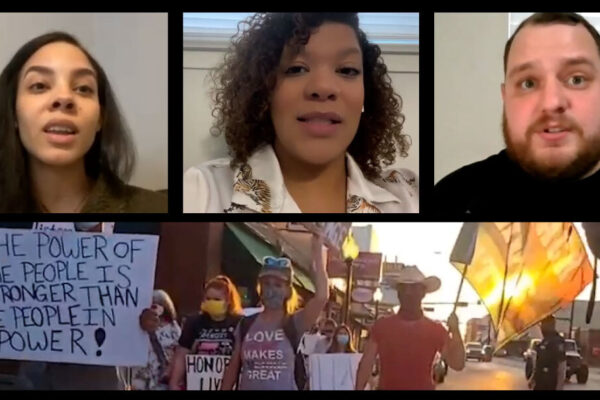AUSTIN, Texas – The American Civil Liberties Union of Texas, the ACLU, and Deandra Grant Law formally petitioned Texas’ highest criminal court to review the case of three North Texas community advocates who are challenging their conviction of obstructing a highway. They were arrested and convicted after a peaceful march in 2020 calling for the removal of a Confederate statue outside the Cooke County courthouse.
The petition submitted Tuesday asks the Texas Court of Criminal Appeals to accept review of the organizers’ case and ultimately to reverse their previous conviction and acquit them of the charge of obstructing a highway.
“This is a pivotal case for free speech rights in Texas,” said Savannah Kumar (she/they), an attorney with the ACLU of Texas. “It concerns whether protesters can move along public streets without facing jail time and whether organizers of peaceful protests can be held criminally responsible for the words and actions of other participants. We are asking the highest criminal court of Texas to take this case and reaffirm that Texans cannot be convicted for simply walking in a street.”
On August 30, 2020, PRO Gainesville organizers Torrey Henderson, Amara Ridge, and Justin Thompson marched peacefully with approximately three dozen people on a route outside the county courthouse in Gainesville, a small town one hour north of Dallas.
A few days later, they were issued arrest warrants for “obstructing a highway or other passageway,” a misdemeanor under Texas law, even though they had not caused an obstruction.
In August of 2022, Henderson, Ridge, and Thompson were convicted and sentenced to seven days in jail and each ordered to pay a $2,000 fine. In November 2023, the Seventh Court of Appeals in Amarillo upheld their convictions. Their freedom and Texans’ ability to exercise their right to peacefully protest on public streets now hinges on a review by the Court of Criminal Appeals.
“Since our country’s founding, public streets and sidewalks have always been a place where people can march and exercise their First Amendment rights,” said Emerson Sykes (he/him), senior staff attorney with the ACLU Speech, Privacy and Technology Project. “It is unconstitutional to arrest and jail protesters just because they momentarily walk in a street, and it conflicts with Texas state law and precedent recognizing the importance of the right to protest.”
PRO Gainesville is a grassroots group of residents that formed in June 2020, inspired by the nationwide protest movement in solidarity with George Floyd, to call for racial justice in their town. The Confederate statue remains on display in Gainesville.
The three community advocates spoke out about why they want the Court of Criminal Appeals to review their case.
“We founded PRO Gainesville in 2020 to advocate for equality and racial justice in our community,” said Torrey Henderson (she/her). “Just as Martin Luther King, Jr. and millions of Americans before us have marched on the streets to advocate for a better world, we too marched peacefully in Gainesville to call for the removal of a Confederate monument on the courthouse lawn. We should not be facing jail time for exercising our constitutional rights to march and protest.”
“Gainesville, Texas has a long history of racism and violence against Black Americans that includes the Great Hanging and terrorism from the Ku Klux Klan,” said Amara Ridge (she/her). “I marched peacefully for a more just and equal world for my children to grow up in, and for that, I was scapegoated and criminalized. Seeking review by the Court of Criminal Appeals gives us hope that this miscarriage of justice can still be corrected.”
“PRO Gainesville has always tried to call for racial justice within the bounds of the law and continuously worked with law enforcement to ensure that our marches were safe and lawful,” said Justin Thompson (he/him). “We are deeply distressed that even though we thought we were doing everything right, we are facing jail time for engaging in a peaceful and orderly march. We are humbly asking the Court of Criminal Appeals to correct this grave injustice.”
Witness their story in their own words.
Access a copy of the filing here.
Related Content

ACLU of Texas and ACLU Urge U.S. Supreme Court to Defend First Amendment Right to Protest
Stay Informed
Sign up to be the first to hear about how to take action.
By completing this form, I agree to receive occasional emails per the terms of the ACLU’s privacy statement.
By completing this form, I agree to receive occasional emails per the terms of the ACLU’s privacy statement.

